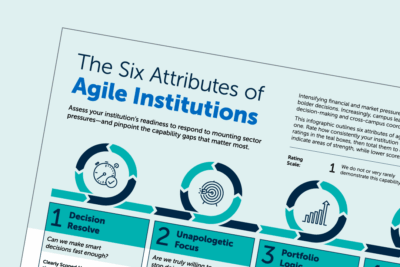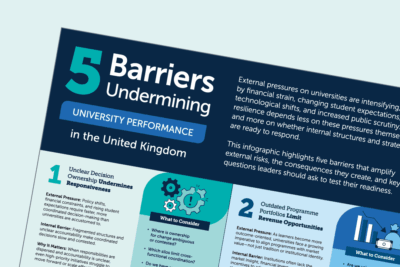Four insights to set your university’s international strategy champion up for success
Universities across the globe have collaborated for decades to increase student mobility, expand research impact, and solve global challenges. However, as the number and complexity of these collaborations have increased, so have the number of parties involved. This often this leads to a proliferation of MOU’s with little coordination or strategic oversight. Institutions are unaware of the full scope of collaborations, potential risks, and opportunities for growth. To help minimize risk and maximize the impact of their global partnerships, institutions are increasingly turning to a centralized, international strategy champion to advance their collaborations. An international strategy champion is a senior leader (e.g., Vice President of Global Engagement, Vice Chancellor of Global Affairs) that directly oversees international activities and/or coordinates with other leaders to execute an institutional international strategy.
EAB interviewed over 50 international strategy champions and their collaborators to better understand what allows them to effectively manage their institution’s partnerships. Continue reading to learn the four most important insights for success.
Insight #1: Create a partnerships database to help your champion manage partnerships and evaluate performance.
Partnership data is essential to help your champion quickly get up to speed on the current state of partnerships at your institution. Without data, your champion may never know the true scope of international partnerships. They will have to spend valuable time tracking down partnership owners to learn about the institution’s international portfolio, the status of individual agreements, and where resources are being deployed.
Additionally, a partnerships database enables champions to evaluate partnerships performance and make decisions about where to create and grow partnerships. Collect forward looking metrics that help reflect the direction of a partnership. These metrics may include mutual number of students and faculty exchanged, grants applied for and won, and new collaborations formed as a result of the existing partnership. Additionally, collect qualitative metrics that highlight partner reliability, such as partner responsiveness and mutual trust.
Insight #2: Give your international champion a title and access that enables them to credibly manage partnerships and make decisions.
At a recent convening of university leaders, 66% of attendees reported they have an international strategy champion on campus; however, more than half of this same group said their champion lacks the proper authority and resources to effectively do their job. This often manifests itself in three ways: lack of authority, lack of access, and lack of resources.
-
53%
of attendees with an international strategy champion role on campus reported the individual did not have sufficient authority and/or resources.
First, provide your champion with a high-profile title such as Vice President for Global Relations or Associate Vice Provost for Global Affairs that gives them the standing and the clout to make decisions. Second, ensure your international champion has access to senior leaders through a seat in the cabinet, a direct reporting line to a senior leader (e.g., Provost, Vice President of Research), or a regular convening of senior leaders that the champion chairs. Third, when budget allows, provide the champion with FTEs that can perform specialized tasks such as creating partner intelligence reports for faculty, auditing partnership data, or developing foreign interference and other educational material for campus stakeholders.
Insight #3: Create an administrative structure that easily interfaces with partner institutions.
International champions in-seat report that having a fellow international strategy champion at their partner institution(s) drives partnership success. Conversely, partnerships with institutions that lack an international champion or possess a very decentralized structure are much harder to collaborate with. Evaluate how your peers and partner institutions structure their international offices to learn how your institution can best interface with them. Aside from an international champion executive, consider how to structure positions that manage the day-to-day partnership operations, such as partnership managers or regional managers, to ensure these roles can coordinate and collaborate between your campuses.
Insight #4: Seek both academic and administrative experience in your hire.
While international champions often possess strong academic qualifications (e.g., PhD, tenured faculty member), champions should also possess administrative experience to effectively manage extensive international portfolios. Consider hiring a champion with international administrative experience, such as managing an internationally-focused institute or serving as an international dean. Administrative qualifications may include the following experiences:
- Collecting and monitoring data to evaluate performance
- Making financial decisions to support growth
- Setting and communicating strategy
- Communicating results to stakeholders.
More Resources

The six attributes of agile institutions

EAB’s Higher Ed State of the Sector
